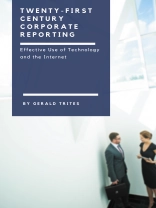How and why do corporations use the internet for reporting to their stakeholders? How and why has corporate reporting extended beyond financial reporting to include environmental, social, and governance (ESG) reporting and even integrated reporting. The major drivers of modern reporting have changed, to include data driven decision making, big data, and advanced analytics, as well as the use of electronic representations of data with tools such as XBRL.
Here we explore the various vehicles for using the internet, including social media and blogs as well as corporate websites and the websites of regulators. And we delve into the impact of portable devices, like smartphones and tablets. Corporate reporting on the internet is changing fast because of changes in technology and stakeholder expectations. Companies are having a hard time keeping up.
This book offers a roadmap to follow–a roadmap to start on now. Most importantly, the book lays out a strong case for integrated reporting and shows how reporting on the internet is ideally suited to the creation of integrated reports. This book is of interest to executives in charge of the reporting function for their companies, students of accounting and management, and to serious investors and others with a strong interest in corporate reporting and the direction in which it is headed.
Despre autor
Gerald Trites is a CPA with a history of writing and publishing and a unique background. He was a partner in KPMG for seventeen years, and a professor of accounting and information systems at St Francis Xavier University in Nova Scotia. He also served for twelve years as director of XBRL Canada. He has published twelve books and numerous articles and papers. He worked as a research associate for the Canadian Institute of Chartered Accountants and served as chair of the Auditing Standards Board. He currently serves as editor-in-chief of Think TWENTY20 magazine, a publication he started in 2019 with the objective of publishing well-researched articles of substance.












